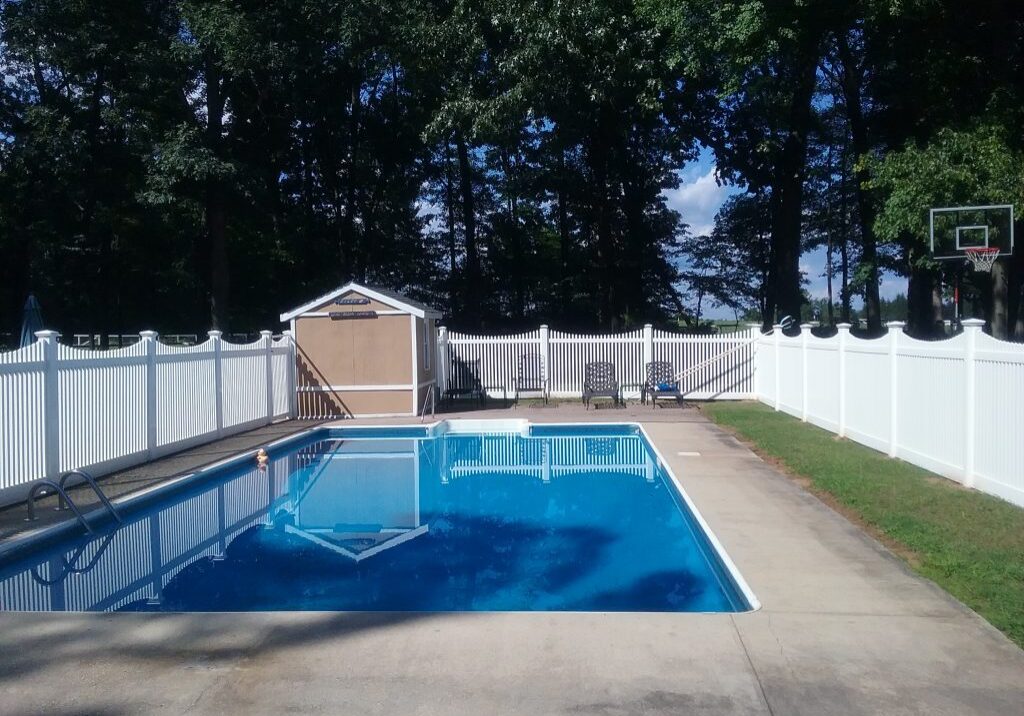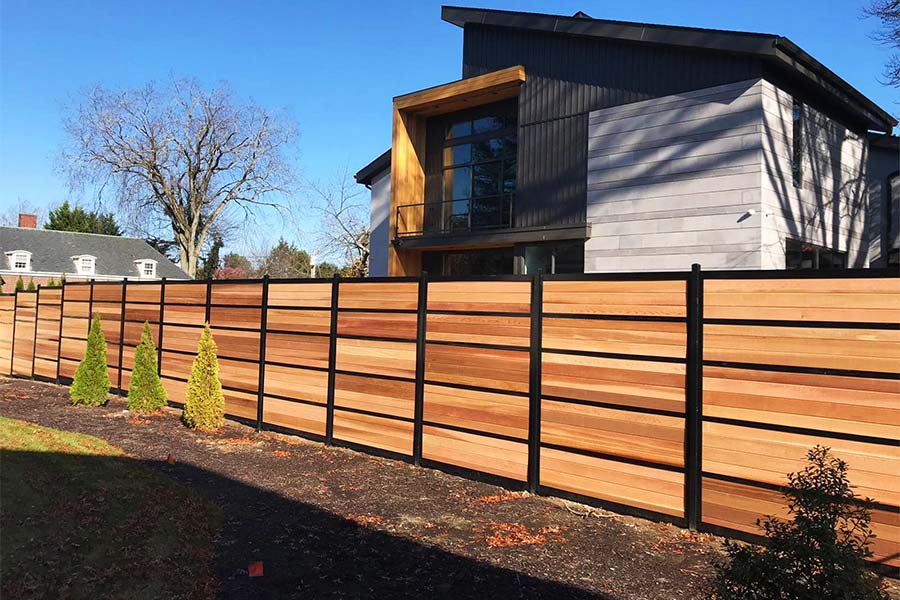All Categories
Featured
Selecting the right fence material for your property is not practically looks; it's concerning privacy, longevity, and safety. Whether you're wanting to improve the appeal of your home or business, safeguard your residential or commercial property, or produce a personal sanctuary, the material you pick will certainly play a significant role in attaining your objectives. With so lots of fencing choices available, it is essential to recognize the advantages and disadvantages of each before making your choice.
Advantages:
Natural Visual: Wood has a cozy, all-natural allure that improves the appearance of any type of building. Customizable: Wood fences can be repainted, discolored, or left neglected to achieve various styles. Privacy: A high wood fencing can provide a high degree of privacy for your home. Downsides:
Maintenance Required: Timber fences call for regular maintenance, including staining and sealing to avoid damage from climate and parasites. Vulnerable to Weather condition: Wood can warp, rot, or become plagued with termites if not appropriately maintained. Much Shorter Life Expectancy: Contrasted to materials like plastic or metal, wood typically has a much shorter life expectancy. Best For: Homeowners looking for a standard, personalized, and all-natural look.
![]()
Advantages:
Reduced Maintenance: Plastic doesn't need painting, discoloration, or sealing. It's simple to clean with an easy tube down. Sturdy: Immune to rot, termites, and weather, vinyl fencings last longer than timber fences. Range of Styles: Available in numerous designs, colors, and structures to fit any kind of residential or commercial property. Drawbacks:
Higher Preliminary Expense: The upfront cost of vinyl fence is normally more than wood or chain link. Prone to Breaking: In extreme chilly or with heavy influence, vinyl fencings can break or damage. Less Adjustable: Unlike timber, plastic provides less alternatives for paint or discoloration. Best For: Organizations or property owners searching for a low-maintenance, long-lasting, and long lasting fence alternative.
Benefits:
Stamina and Toughness: Steel fences are solid, resistant to put on, and long-lasting. Low Maintenance: Once installed, metal fences need little upkeep, particularly light weight aluminum, which withstands rust. High Protection: Metal fences are difficult to climb up and give an effective obstacle against trespassers. Disadvantages:
Cost: Steel fencings, specifically wrought iron and steel, can be extra expensive than various other choices. Corrosion and Deterioration: Steel fencings, in particular, might rust without appropriate treatment. Light weight aluminum is corrosion-resistant, yet wrought iron requires normal maintenance. Restricted Personal privacy: Steel fencings do not offer much personal privacy unless they are incorporated with other materials, like timber slats or plastic inserts. Best For: Those who focus on safety and toughness over personal privacy, or those with a high end building looking for a classy, timeless fencing.
Benefits:
Economical: Chain link is just one of one of the most affordable fence choices offered. Reduced Maintenance: As soon as mounted, chain web link fences need little maintenance beyond periodic cleansing. Durable: Chain link is solid and can last for several years if appropriately kept. Negative Aspects:
![]()
Minimal Aesthetics: Chain web link fences do not offer the aesthetic allure of wood or wrought iron, and can look utilitarian. Privacy Concerns: Unless personal privacy slats or vinyl layers are included, wire mesh fence do not supply much personal privacy. Less Safe in Some Locations: While chain link offers security, it can be quickly scaled or cut otherwise set up with added security attributes. Best For: Commercial residential properties, large houses, or areas where security is more vital than aesthetic appeals.
Benefits:
Reduced Upkeep: Compound fencings call for no discoloration, sealing, or painting. Resilience: Immune to pests, rot, and weather condition damage, composite fences last longer than timber. Eco-Friendly: Lots of composite fencings are made from recycled materials, making them a lasting option. Downsides:
Greater Price: Composite fencings can be extra expensive than standard wood or vinyl alternatives. Restricted Personalization: While readily available in different shades and styles, composite fences do not provide the exact same customization choices as timber fences. Heavy: Compound secure fencing materials can be larger than other alternatives, making installment a lot more labor-intensive. Best For: Eco-conscious home owners or organizations looking for a low-maintenance, long-lasting, and lasting fence product.
Conclusion. Choosing the best fencing material for your home ultimately depends upon your top priorities-- whether it's safety and security, personal privacy, visual appeals, or reduced maintenance. From timeless timber and cost effective chain link to sturdy vinyl and strong metal, each material supplies special advantages fit to various requirements. By thinking about variables like budget, setup time, maintenance requirements, and long-lasting toughness, you can select the optimal fencing that satisfies your residential property's particular requirements.
- Wood Fencing. Timber is just one of one of the most prominent fencing products because of its versatility, classic charm, and natural look. It's ideal for properties and can be utilized in a selection of designs, consisting of privacy fences, picket fencings, and post-and-rail fencings.
Advantages:
Natural Visual: Wood has a cozy, all-natural allure that improves the appearance of any type of building. Customizable: Wood fences can be repainted, discolored, or left neglected to achieve various styles. Privacy: A high wood fencing can provide a high degree of privacy for your home. Downsides:
Maintenance Required: Timber fences call for regular maintenance, including staining and sealing to avoid damage from climate and parasites. Vulnerable to Weather condition: Wood can warp, rot, or become plagued with termites if not appropriately maintained. Much Shorter Life Expectancy: Contrasted to materials like plastic or metal, wood typically has a much shorter life expectancy. Best For: Homeowners looking for a standard, personalized, and all-natural look.
- Vinyl (PVC) Fence. Vinyl fencings are a progressively preferred selection as a result of their low upkeep and longevity. Made from artificial materials, plastic fencings are immune to rot, degeneration, and bugs. Readily available in a variety of shades and styles, vinyl fence can be designed to simulate the appearance of timber without the connected upkeep.

Advantages:
Reduced Maintenance: Plastic doesn't need painting, discoloration, or sealing. It's simple to clean with an easy tube down. Sturdy: Immune to rot, termites, and weather, vinyl fencings last longer than timber fences. Range of Styles: Available in numerous designs, colors, and structures to fit any kind of residential or commercial property. Drawbacks:
Higher Preliminary Expense: The upfront cost of vinyl fence is normally more than wood or chain link. Prone to Breaking: In extreme chilly or with heavy influence, vinyl fencings can break or damage. Less Adjustable: Unlike timber, plastic provides less alternatives for paint or discoloration. Best For: Organizations or property owners searching for a low-maintenance, long-lasting, and long lasting fence alternative.
- Steel Secure Fencing (Light Weight Aluminum, Steel, and Wrought Iron) Steel fencings are known for their toughness, security, and visual worth. Aluminum, steel, and functioned iron fencings are commonly utilized in property, business, and industrial settings, supplying high levels of protection and an advanced appearance.
Benefits:
Stamina and Toughness: Steel fences are solid, resistant to put on, and long-lasting. Low Maintenance: Once installed, metal fences need little upkeep, particularly light weight aluminum, which withstands rust. High Protection: Metal fences are difficult to climb up and give an effective obstacle against trespassers. Disadvantages:
Cost: Steel fencings, specifically wrought iron and steel, can be extra expensive than various other choices. Corrosion and Deterioration: Steel fencings, in particular, might rust without appropriate treatment. Light weight aluminum is corrosion-resistant, yet wrought iron requires normal maintenance. Restricted Personal privacy: Steel fencings do not offer much personal privacy unless they are incorporated with other materials, like timber slats or plastic inserts. Best For: Those who focus on safety and toughness over personal privacy, or those with a high end building looking for a classy, timeless fencing.
- Chain Web Link Fencing. Chain web link fencings are among the most budget-friendly and useful options offered. Generally utilized in business settings, they can likewise be an excellent selection for homes, specifically if security is a leading priority. Chain link fencings are readily available in different heights and can be personalized with personal privacy slats for included security.
Benefits:
Economical: Chain link is just one of one of the most affordable fence choices offered. Reduced Maintenance: As soon as mounted, chain web link fences need little maintenance beyond periodic cleansing. Durable: Chain link is solid and can last for several years if appropriately kept. Negative Aspects:

Minimal Aesthetics: Chain web link fences do not offer the aesthetic allure of wood or wrought iron, and can look utilitarian. Privacy Concerns: Unless personal privacy slats or vinyl layers are included, wire mesh fence do not supply much personal privacy. Less Safe in Some Locations: While chain link offers security, it can be quickly scaled or cut otherwise set up with added security attributes. Best For: Commercial residential properties, large houses, or areas where security is more vital than aesthetic appeals.
- Composite Secure fencing. Compound fences incorporate timber fibers and plastic to develop a sturdy, green option to typical wood fence. These fences have the appearance of wood however need much less upkeep and are resistant to rot, parasites, and fading.
Benefits:
Reduced Upkeep: Compound fencings call for no discoloration, sealing, or painting. Resilience: Immune to pests, rot, and weather condition damage, composite fences last longer than timber. Eco-Friendly: Lots of composite fencings are made from recycled materials, making them a lasting option. Downsides:
Greater Price: Composite fencings can be extra expensive than standard wood or vinyl alternatives. Restricted Personalization: While readily available in different shades and styles, composite fences do not provide the exact same customization choices as timber fences. Heavy: Compound secure fencing materials can be larger than other alternatives, making installment a lot more labor-intensive. Best For: Eco-conscious home owners or organizations looking for a low-maintenance, long-lasting, and lasting fence product.
Conclusion. Choosing the best fencing material for your home ultimately depends upon your top priorities-- whether it's safety and security, personal privacy, visual appeals, or reduced maintenance. From timeless timber and cost effective chain link to sturdy vinyl and strong metal, each material supplies special advantages fit to various requirements. By thinking about variables like budget, setup time, maintenance requirements, and long-lasting toughness, you can select the optimal fencing that satisfies your residential property's particular requirements.
Latest Posts
Classy, Durable Floor Tile Floor Covering for Every Space
Published Apr 20, 25
1 min read
Just How We Make Flooring Easy at Carpet Interiors Floor & Home
Published Apr 20, 25
1 min read
Teen Self-reliance Account: A Smart Beginning to Financial Freedom
Published Apr 20, 25
1 min read
More
Latest Posts
Classy, Durable Floor Tile Floor Covering for Every Space
Published Apr 20, 25
1 min read
Just How We Make Flooring Easy at Carpet Interiors Floor & Home
Published Apr 20, 25
1 min read
Teen Self-reliance Account: A Smart Beginning to Financial Freedom
Published Apr 20, 25
1 min read